Мы продолжаем напряженно работать, чтобы улучшить наш сайт и перевести его на другие языки. Русская версия этой страницы еще не совсем готова. Поэтому мы представляем здесь пока английскую версию. Мы благодарим вас за понимание.
Александр Пушкин
Pushkin… no Russian who doesn't know the name. The famous poet doesn't appear in The Master and Margarita, but he is more than present in the novel. Alexander Sergeevich Pushkin (1799-1837) is widely considered as the most important Russian poet, and as one of the greatest poets in world litterature.
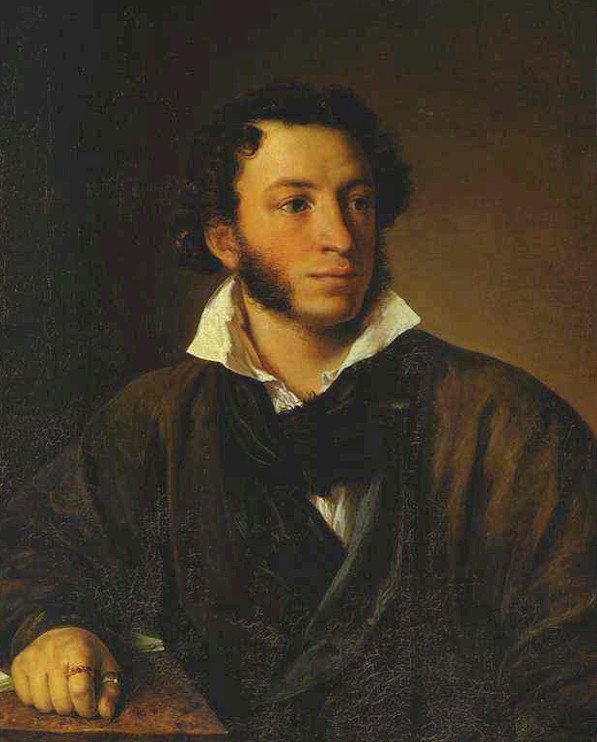
Alexander Sergeevich Pushkin
Biography
Pushkin was born in Moscow on June 6, 1799, as the son of impoverished nobility. Pushkin's mother's grandfather Abram Petrovich Gannibal (1696-1781) was a Paris-educated slave from what is now Cameroon, who was offered to czar Peter the Great (1672-1725) as a present. Pushkin's passionate temperament and sensuality are sometimes attributed to this «negroid» descent.
In his childhood, Pushkin was raised almost solely in French, and he proved to have a phenomenal memory - when he was eleven years old he knew the almost complete French literature of that time by heart. It was his nurse, his nyanya, who made him familiar with the Russian language by telling him fairy tales and popular legends. His adaptation of one of these fairy tales, Ruslan and Lyudmila, made him famous in the whole country at a tender age.
In 1811, Pushkin started studying at the elite lyceum of Tsarskoe Selo, set up by the czar near Saint-Petersburg. His exceptional talent as a poet was noticed very quickly. After six happy years in the lyceum, Pushkin installed himself in the vibrant and raucous intellectual youth culture of the capital Saint-Petersburg. His turbulent love life did not prevent him from being further devoted to the art of poetry.
In czarist Russia, however, censorship was severe, and Pushkin's pen was razor-sharp. Everything he did was observed closely and a poem like Ode to Freedom (1818) and many epigrammes circulated in libertarian and anti-czaristic circles. In 1820, Pushkin was banned from Saint-Petersburg. It probably saved his life, because it prevented him from participating, like many of his literary friends did, to the Decabrist Conspiracy in 1825.
While in exile on the countryside, Pushkin wrote a major part of his masterpiece, the ultimate poem in Russian literature, Yevgeny Onegin. In 1826, czar Nicholas I (1796-1855) withdrew his exile under very strict conditions. Alexander Pushkin returned to Saint-Petersburg, but he was more or less a «prisoner» of the czar.
After innumerable amorous escapades, Pushkin married, in 1831, the very pretty Natalya Nikolaevna Goncharova (1812-1863), his 113th love as he called her, but also his Madonna. Natalya gave birth to four children and the marriage seemed to be happy, if it wasn't for Pushkin's jealousy which played him false. It's a supposed «affair» of Natalya which was the direct cause of a fatal duel between Pushkin and the French diplomat Georges-Charles de Heeckeren d'Anthès (1812-1895).
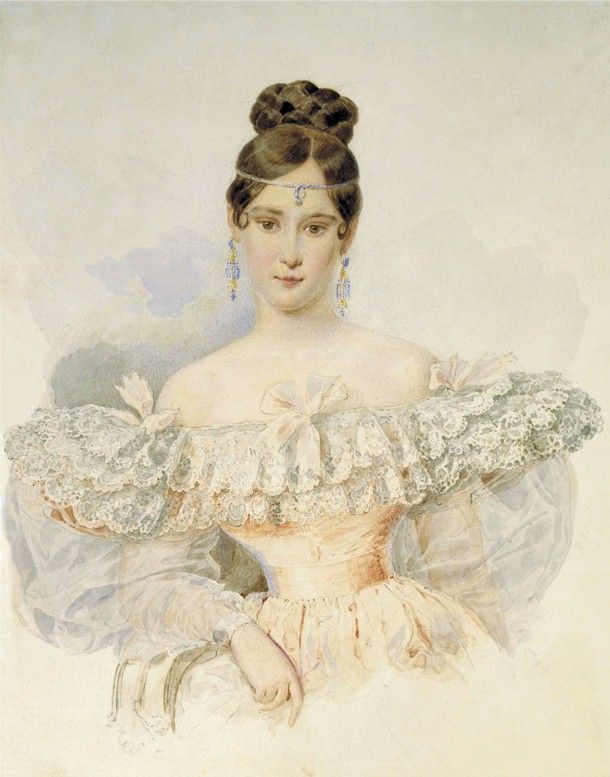
Natalya Nikolaevna Goncharova
D'Anthès had married Natalya's sister, Yekaterina Nikolaevna Goncharova (1809-1843), on January 10, 1837. It has been suggested that d'Anthès' engagement and marriage to Yekaterina was devised to contradict society gossip that he was in pursuit of Natalya. Pushkin's jealousy made him write an insulting letter to d'Anthès' adoptive father. Since Pushkin refused to withdraw these abuses, a duel became inevitable. On the evening of January 27, 1837, d'Anthès fired first, mortally wounding Pushkin in the stomach. Pushkin, who had fought already twenty-eight duels in his life, managed to rise and shoot at d'Anthès, but only wounded him lightly in the right arm. Alexander Sergeevich Pushkin died as a result of this duel on January 29, 1837. Many people thought - and still think - that there was an intrigue of government behind it.
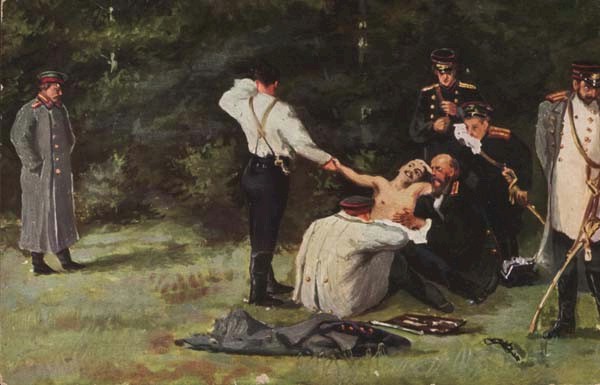
Pushkin after the duel
Besides an extensive lyrical poetry with many love poems and other verses like I Loved You, Night, Winter evening and Autumn, Pushkin left us prose too, like The Captain's Daughter, The history of Pugachev's Riot and Queen of Spades.
The Russians and Pushkin
Alexander Pushkin is still honoured and read throughout the Russian world and far beyond. From a very young age, the children get acquainted to his poetry in Russian fairy tales and later on they continue to read his work for its smooth, wonderful, melodious language. I don't dare to count the number of Pushkin statues in Russia. In the centre of Moscow there are three of them at a walking distance from each other.
Many Russians start being lyrical when the name Pushkin is mentioned, and they will often say that non-Russians can't understand his work. Or that you can't understand the Russian soul if you are unable to understand Pushkin. But how «Russian» is Pushkin? At the beginning of this article was already mentioned that part of his roots were African.
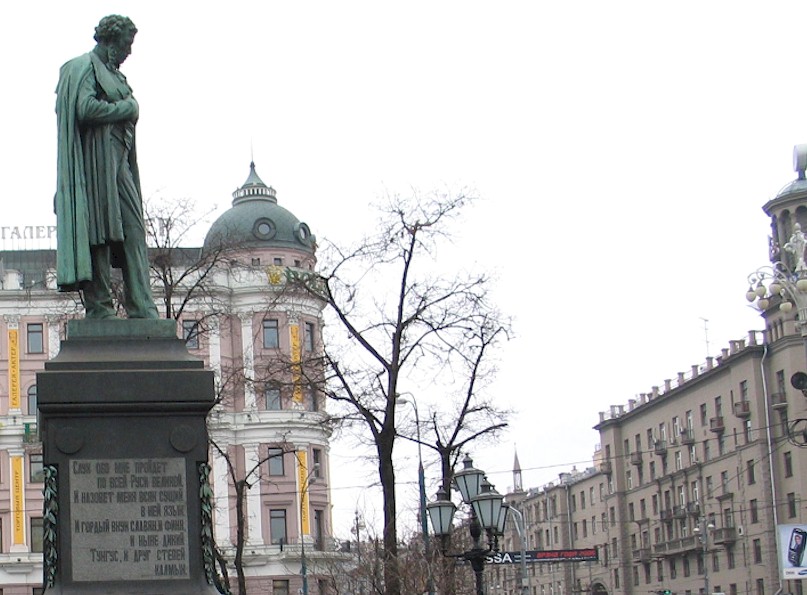
Statue of Alexander Pushkin on Pushkin square in Moscow
Bulgakov and Pushkin
Pushkin appears in The Master and Margarita in different forms: as the author of Yevgeny Onegin, when, during Ivan's chase in chapter 4, from every window, every door, every gateway, roof, and attic, basement and courtyard blared the hoarse roar of the polonaise from the opera of the same name; as the statue which Riukhin sees on his way back to Moscow from doctor Stravinsky's hospital; as the author of The Covetous Knight which Kurolesov recites in Nikanor Ivanovich's dream, and finally as the character that Soviet citizens often use in their daily language.
Bulgakov loved Pushkin, like all Russians do, but he felt particularly familiar with him because of his relation to athorities. Pushkin has been banned and czar Nicholas became his personal censor. While he worked on The Master and Margarita, Bulgakov wrote a theatre play, Alexander Pushkin or The Last Days which described the relation between the artist or the genius and the repressive state.
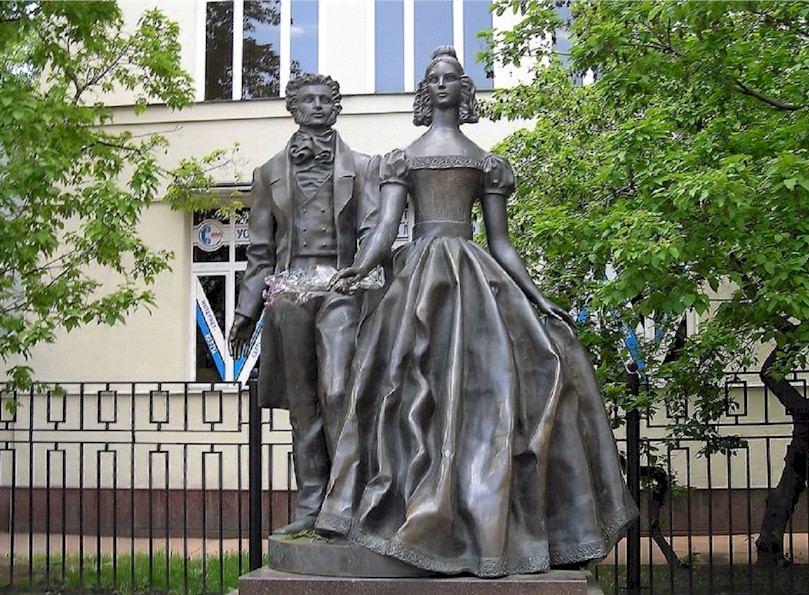
Statue of Alexander Pushkin and Natalya on the Arbat
We know that Pushkin's art has given him some kind of immortality which can not be whiped out by any political manipulation - and that is Bulgakov's irony. Because, though Pushkin never appears as a character in the novel, he succeeds in claiming a central role in it.